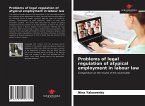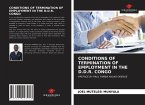The influence of NICTs on human resources management has been the subject of a great deal of thought by both legal experts and human resources managers. Legal experts have discussed the conditions for reconciling "cybersurveillance" mechanisms with employees' fundamental right to privacy, while human resources managers have measured the influence of NICTs on organizational flexibility. So how can we reconcile or adapt "cybersurveillance" to the demands of the right to privacy? This book is interesting for two reasons. On the one hand, it takes stock of the ways in which companies monitor employee behavior, and on the other, it assesses their legitimacy in light of the need for corporate social responsibility. This book is aimed at companies, trade unions and employers' organizations, government ministries in charge of labor, academics, corporate lawyers and human resources managers, specialized HR firms, judges and lawyers, students and cyberlaw researchers.
Bitte wählen Sie Ihr Anliegen aus.
Rechnungen
Retourenschein anfordern
Bestellstatus
Storno








